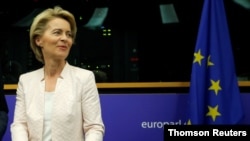The nomination of German politician Ursula von Der Leyen to become the European Commission’s next president is proving more divisive than her backers feared — especially in her home country, where opinion polls suggest most Germans disapprove of her selection and believe she’s unsuitable for the job.
Opposition in Germany is adding to the challenge Germany’s current defense minister faces in persuading an absolute majority in the European Parliament to ratify her nomination later this month.
A backlash to the backroom way she was nominated last week to take over from Jean-Claude Juncker in the EU’s top job is building in the parliament, with EU lawmakers complaining her nomination process was “a slap in the face for democracy” and pulls Europe deeper into opaque backroom deal making.
Some say parliamentary ratification isn’t a foregone conclusion.
“I think there is a huge resistance against her,” Dutch MEP Paul Tang told a European broadcaster. “There will be huge resistance from the left-hand side and the populist right-hand side,” he added.
Unexpected pick
Von Der Leyen was the surprise choice for the job. Her candidacy was put forward by French President Emmanuel Macron after the lead candidates proposed by pan-European parliamentary alliances were blocked by various national leaders. Negotiations took more than 50 hours and played out over several days.
Central Europeans opposed Dutch Socialist Frans Timmermans and Juncker’s deputy because of his criticism of Poland and Hungary over rule-of-law standards; and Macron also, along with Hungary’s prime minister, Viktor Orban, vetoed German Manfred Weber, the center-right candidate and German Chancellor Angela Merkel’s preferred candidate. Macron argued he wasn’t up to the job.
Von Der Leyen and Macron have bonded over the French president’s ambitions to establish a European army and continent-wide defense projects. They were seen deep in conversation last month during an air show in France.
In picking von Der Leyen, the leaders of EU member states cast aside the so-called lead candidate system. Under that system, pan-European parliamentary alliances of national parties nominate a lead candidate, ahead of EU parliamentary elections. The European Council, made up of national leaders, would then nominate for the top job the candidate of the winning alliance or the one who could command majority support in the parliament. The system is intended to bring more openness and democracy to the choice of commission chief.
The process, which was put in place in 2014, was observed in the case of the appointment of Luxembourg’s Juncker. But many national leaders dislike the system. They argue the EU treaties don’t require national leaders to follow what the parliament wants when choosing a nominee for the commission presidency.
Even Juncker, a politician well-versed in the arts of backroom dealing, has criticized the nomination process of his replacement for its lack of transparency.
Seeking support
The 60-year-old von Der Leyen is now scrambling to woo lawmakers, focusing heavily on the Greens, a political group that surged in recent EU parliamentary elections, making substantial gains. The Greens are pushing for some climate-action commitments from her and their leaders say they will extract a high price for their vote.
Some parliamentary groups have said they won’t decide whether to back her until they’re sure their preferred candidates have secured various EU posts or her endorsement of their pet policies. But EU critics say the parliamentary parties are doing exactly what they criticize the national leaders of — horse-trading behind closed doors.
The disapproval of von Der Leyen, though, who was a protege of German Chancellor Angela Merkel, then fell out of favor with her, and later was rehabilitated with the country’s defense ministry, is most noteworthy in Germany and is focusing on her track record.
A mother-of-seven, von Der Leyen has a reputation for toughness — one of her nicknames is “Steel Magnolia” — but she has been accused of being one of the weakest ministers in Merkel’s Cabinet. She comes from EU bureaucratic stock — her father from Lower Saxony was an early civil servant in the fledgling EU and she was educated in Brussels, as well as Germany and London.
According to a poll published in the German national newspaper Bild, only a third of Germans think she is qualified for the high-profile job. While 71 percent were happy a German had been nominated to succeed Juncker, 53 percent viewed her nomination as a “deception of voters.”
Even members of her own — and Merkel’s — Christian Democratic Party are unenthusiastic about her.
Disarmament accusations
Much of the disapproval of von Der Leyen centers around her tenure at the defense ministry, where she has been highly unpopular.
“One needs only to study the reactions of the officers of the German Army, the Bundeswehr, to get an objective picture of her qualification: a big sigh of relief!” according to former EU lawmaker Hans-Olaf Henkel.
Last year, the German parliament's military commissioner issued a scathing report on the state of readiness of Germany's armed forces, noting that only a fraction of crucial weapons systems were operational. At the end of 2017, six out of six of the navy's submarines were out of commission and none of the air force's 14 large transport planes were available for deployment due to repairs. More than 20,000 officer and non-commissioned officer positions were unfilled. Many fighter jets, tanks and ships are outdated or in disrepair, the commissioner noted.
The report urged the government to pursue reforms “with greater urgency.”
“Von Der Leyen is responsible for the biggest disarmament of a German army after its defeat in two world wars. German tanks don‘t run, German planes are grounded, German navy ships are anchored due to lack of maintenance, funds and personnel,” said Henkel, a former president of the Federation of German Industries and one of her sharpest critics.
The ministry also is being rocked by a financial scandal, which is being investigated by the German parliament.







